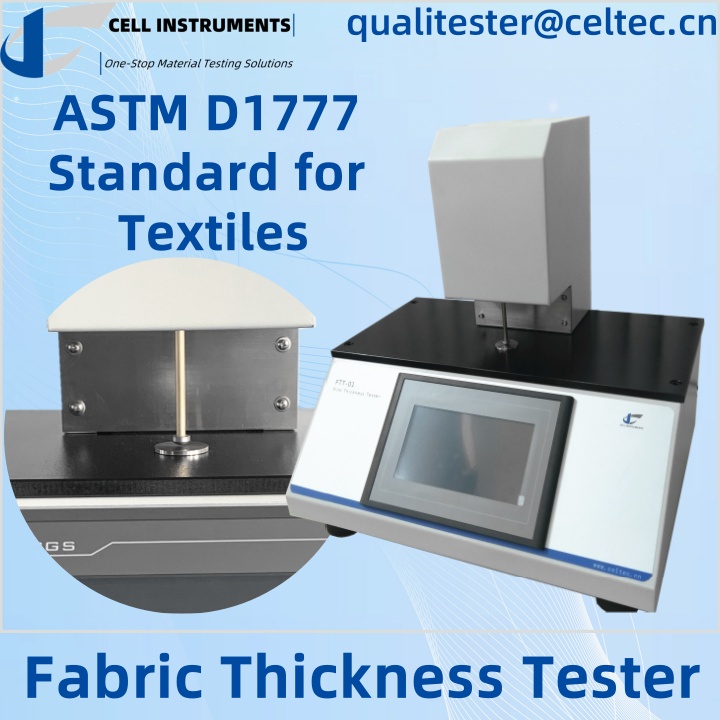Choosing the Best Fabric Thickness Tester: A Focus on ASTM D1777 and ISO 3034 Compliance
Introduction
Ensuring consistent and accurate fabric thickness is critical in the textile industry, as material quality directly impacts product performance and consumer satisfaction. A fabric thickness tester is a specially designed instrument used to measure the thickness of a variety of textiles to ensure they meet industry standards such as ASTM D1777, ISO 3034, and others. This article will explore the importance of fabric thickness testing, the role of different standards, and how to choose the fabric thickness tester that is best for you.
Importance of Fabric Thickness Testing
Fabric thickness plays a critical role in a variety of applications, from apparel manufacturing to industrial textiles. Thickness not only affects the feel and appearance of a fabric, but also its durability, thermal insulation properties, and suitability for a particular purpose. Accurate measurements are essential to maintaining quality control, meeting regulatory requirements, and ensuring that the end product performs as expected.
Key Standards for Fabric Thickness Testing
ASTM D1777: Standard for Textiles
ASTM D1777 outlines standard test methods for measuring the thickness of textile materials. It provides guidance for sample preparation, instrument calibration, and measurement procedures to ensure consistent and reliable results across laboratories and applications.
ISO 3034: Corrugated fiberboard
ISO 3034 specifies methods for measuring the thickness of corrugated fiberboard, a material commonly used in packaging. While not directly relevant to textiles, it may be helpful to be aware of this standard when dealing with fabrics used in composites or similar applications.
ISO 534: Paper and paperboard
ISO 534 provides methods for determining the thickness of paper and paperboard, which are also applicable to certain textiles, particularly those with similar properties or used in conjunction with such materials.
ISO 4593: Plastics — Film and sheeting
Although ISO 4593 is primarily concerned with plastics, it also provides methods for testing thin materials, which may be relevant to certain textiles, particularly synthetic fibers or laminates.
Choosing the right fabric thickness tester
Selecting the right fabric thickness tester involves a number of factors:
- Accuracy and precision: A tester with high accuracy and minimal bias should be selected to ensure reliable results. Instruments that meet ASTM D1777 and ISO 3034 standards provide a solid foundation for accurate measurements.
- Ease of Use: Testers with user-friendly interfaces, such as those with HMI touchscreens and intuitive software, simplify the testing process and reduce the potential for errors.
- Versatility: Choose a tester that is compatible with a wide range of fabrics, from delicate silks to heavy industrial textiles. Versatile instruments reduce the need for multiple devices, saving time and resources.
- Customizable Setup: Certain applications may require specific testing conditions. Choose a tester that offers customization options to meet these unique needs.
Why Choose a Fabric Thickness Tester from Cell Instruments?
The Cell Instruments Fabric Thickness Tester is an advanced precision tool designed to meet the stringent requirements of the textile industry. It complies with ASTM D1777 and other international standards and features:
- High Accuracy: Ensures precise measurements with minimal deviation, which is critical for quality control.
- User-Friendly Interface: The tester’s HMI touchscreen and intuitive software make it easy to operate, even for users with limited technical knowledge.
- Versatility: Compatible with a wide range of textiles, from lightweight fabrics to heavy industrial materials.
- Customizable Features: Customization options allow for special testing requirements, ensuring the tester can be adapted to a variety of applications.
Conclusion
In the textile industry, ensuring accurate fabric thickness measurements are essential to maintaining product quality and meeting industry standards. Fabric thickness testers that meet ASTM D1777 standards, in particular, provide the accuracy and reliability required to accomplish this task. By choosing a tester that is accurate, easy to use, versatile, and customizable, manufacturers can ensure their products meet the highest quality standards.
FAQ
Why is ASTM D1777 important for fabric thickness testing?
ASTM D1777 provides standardized guidelines for measuring the thickness of textile materials, ensuring consistent, accurate results under different testing conditions.
Can fabric thickness testers measure other materials?
Yes, some fabric thickness testers, such as those from Cell Instruments, have the flexibility to measure materials such as films, foils, and paper, provided that they meet specific thickness requirements.
How often should a fabric thickness tester be calibrated?
Calibration frequency depends on usage, but it is generally recommended to calibrate before each test, or periodically according to the manufacturer’s instructions.
What are the key features to look for when choosing a fabric thickness tester?
Accuracy, ease of use, versatility and customizable settings are key features to ensure reliable and consistent measurement results.
Why choose a fabric thickness tester from Cell Instruments?
Cell Instruments offers fabric thickness testers that meet international standards, have high accuracy and customizable features to meet a variety of testing needs.
Related Products
Benchtop Film
Thickness Tester
Related Article
Film
Thickness Tester for Packaging
Lab
Thickness Tester for Paper
Thickness
Tester for Thin Films
Bench
Thickness Tester for Textile
Thickness
Tester Machine for Textiles

